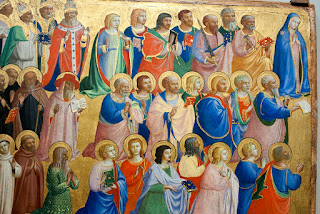The Feast of The Holy Family of Jesus, Mary and Joseph - 26 December 2020
Readings: Eccl. 3:2-6,12-14; Psalm 128:1–2, 3, 4–5; Col 3:12-21; Lk 2:22-40
Simeon, the man of God, who was a righteous and devout man prophesized about the baby Jesus: “Behold, this child is set for the fall and rising of many in Israel” (Lk 2:34). In the same temple there was also a prophetess, Anna, who was eighty-four years old, also knew who this baby Jesus going to be. It is very essential to note right here that the role of the prophet was not assigned only to men but also to women. I have seen often the neighbours or relatives who come to see the new baby express their feelings towards the lowly child with joy. They say the child looks like its mother or father; it has beautiful eyes, nice cheeks and so on. I have also heard people say about the child and what it may become; just like its father or mother or someone else. In a similar way, both Simeon and Anna incidentally prophesize about this newborn child in a temple in Bethlehem.





































